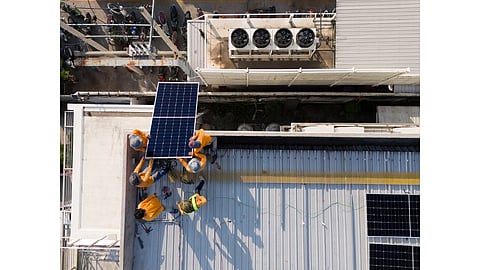

Spain’s self-consumption solar installations declined for the 3rd consecutive year, reaching 611 MW in H1 2025
Industrial self-consumption fell 22.9% amid grid congestion, as volatile daily energy prices limited surplus exports
Residential and storage installations rose sharply after April’s blackout, and with the growing need for security of the electricity supply
Spain has recorded its 3rd straight year of decline in the self-consumption solar segment. According to renewable energy association, Asociación de Empresas de Energías Renovables (APPA Renovables), 611 MW was installed in H1 2025, representing a 14.6% year-over-year (YoY) decline.
On average, Spain installed 100 MW/per month during the reporting period. At this pace, the country risks installing less than 1.43 GW of capacity, which it installed during 2024 (see Spain Installed Over 1.43 GW Solar PV In 2024 For Self-Consumption).
The annual decline in H1 2025 was driven by the industrial segment, as it recorded a 22.9% drop over last year’s installations, despite accounting for around 70% of the total installed capacity during the period.
Flagging the large differences in time-of-day daily energy prices and crowded distribution networks as the factors responsible for the slump in industrial solar demand, the association says companies struggle to export surplus power to the grid and are forced to curtail clean energy. It shares that 19% of clean energy, worth €88 million, was thus wasted in 2024.
“In a time of great geopolitical uncertainty, especially in the energy markets, we cannot allow a lack of investment in networks and storage to ultimately hinder the competitiveness of our industry," said the President of APPA Autoconsumo, Jon Macías.
On the other hand, residential and battery storage installations soared, driven by the nationwide blackout in April, a decline in wholesale prices, and the need for security of electricity supply. Residential self-consumption grew by 11.6% with provisions for such systems to operate in off-grid or island mode to ensure operations during any future network failure events.
Macías added, “The residential market is especially susceptible to change, while the industrial market is more rational. The zero energy market in April marked a turning point for residents, who are seeking to ensure security of supply, including in existing facilities, by equipping them with batteries.”
Storage installations experienced an 88% growth in H1 2025 with 146 MWh, almost the same as in the entire 2024, mainly as retrofits. For residential, the split was 58 MWh, while the industrial sector added 88 MWh, representing 30% and 21% attachment rates, respectively.
APPA Renovables reports rising industrial demand for self-consumption with storage, as it eliminates long waits for new connections, ensures a stable energy supply, and also creates revenue opportunities by providing flexibility services to grid operators.
To exploit this potential, the association seeks incentives for distributed storage.
Recently, Spain released new capacity maps that revealed that more than 83% of distribution network nodes are saturated, thereby blocking new demand and preventing many commercial and industrial (C&I) facilities from injecting surplus power into the grid.
The industry group warns that without enforcing the 10% capacity reserve, updating regulations to expand sharing distances from 500 m to 5 kms, and including other renewables, reinforcing distribution networks, setting clear rules for distributed storage, favorable taxation policies, and bringing in a functional and transparent self-consumption registry at the national level, the country risks missing its 2030 renewable energy targets.
